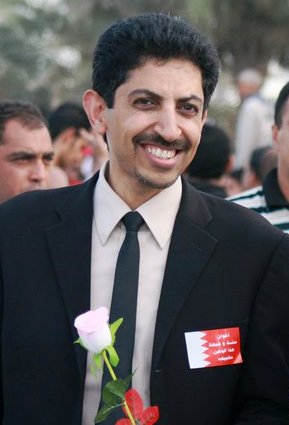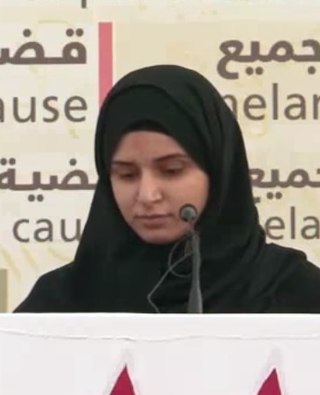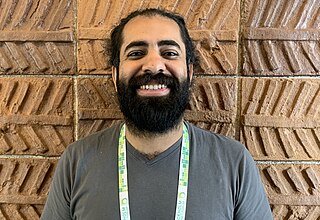Talal Yousef Mohammed, known mainly as Talal Yousef, is a former Bahraini footballer.

Abdulhadi Abdulla Hubail al-Khawaja is a Bahraini political activist. On 22 June 2011, al-Khawaja and eight others were sentenced to life imprisonment following the suppression of pro-democracy protests against the Bahraini government. Al-Khawaja has previously gone on a series of hunger strikes while serving his life sentence, in protest of the political conditions in Bahrain.
Mohamed Hubail is a Bahraini footballer who was sentenced to a two-year term of imprisonment by a special security court in Bahrain after taking part in pro-democratic reform protests in Bahrain in 2011.
Sayed Mohamed Adnan is a Bahraini footballer who once played for the national team, and currently playing for Malkiya.

Sheikh Salman bin Ibrahim Al Khalifa is a Bahraini football administrator. As of 2023 he is Senior Vice-president of the FIFA Council. He has been president of the Asian Football Confederation (AFC) since 2 May 2013. Before becoming president of the AFC, he had been president of Bahrain Football Association (2002–13) and also chairman of the AFC Disciplinary Committee and deputy chairman of the FIFA Disciplinary Committee.

Tariq Jaafar Al-Farsani is a Bahraini bodybuilder. In April 2011 he was arrested after allegedly taking part in pro-democracy reform protests in Bahrain in February 2011. He was detained indefinitely without charge. As of July 2011 his fate is unclear.

Salmaniya Medical Complex is a public hospital situated in the Salmaniya district of Manama in the Kingdom of Bahrain. Established in 1957 and having a bed capacity of approximately 1,200 beds, it is the largest tertiary hospital in the country. The hospital provides secondary, tertiary, and emergency healthcare services as well as specialised outpatient clinics for the general public. Residency programs in the hospital are either Arab Board or Saudi Board certified.

The 2011Bahraini uprising was a series of anti-government protests in Bahrain led by the Shia-dominant and some Sunni minority Bahraini opposition from 2011 until 2014. The protests were inspired by the unrest of the 2011 Arab Spring and protests in Tunisia and Egypt and escalated to daily clashes after the Bahraini government repressed the revolt with the support of the Gulf Cooperation Council and Peninsula Shield Force. The Bahraini protests were a series of demonstrations, amounting to a sustained campaign of non-violent civil disobedience and some violent resistance in the Persian Gulf country of Bahrain. As part of the revolutionary wave of protests in the Middle East and North Africa following the self-immolation of Mohamed Bouazizi in Tunisia, the Bahraini protests were initially aimed at achieving greater political freedom and equality for the 70% Shia population.

Ayat Hassan Mohammed Al-Qurmezi is a poet and student at the University of Bahrain Teaching Institute in Bahrain.
The Port Said Stadium riot was a riot which occurred at Port Said Stadium in Port Said, Egypt on 1 February 2012, following an Egyptian Premier League football match between Al Masry and Al Ahly. Seventy-four people were killed and more than 500 injured after thousands of Al Masry fans invaded the pitch following a 3–1 victory by their club. Al Ahly fans were attacked using clubs, stones, machetes, knives, bottles, and fireworks, trapping them inside the Al Ahly partition of the stadium. Many of the deaths were due to police refusal to open the stadium gates, trapping fans inside and causing a stampede. Civil unrest and clashes with police erupted in several major cities, such as Cairo, Alexandria, and Suez, in response to police's handling of the riot.
Mohamed Yousif Rashid Albuflasa is a Bahraini poet, writer, former independent candidate for the Bahraini Parliament in the 2010 Parliamentary elections and a member of the Bahraini youth parliament. He belongs to the Albuflasa Bedouin clan. Formerly a Bahrain Defence Force officer, he is now employed at the court of Crown Prince Salman bin Hamad bin Isa Al Khalifa.

Mahdi Isa Mahdi Abu Deeb is the founder and leader of Bahrain Teachers' Association (BTA), and Assistant Secretary-General of Arab Teachers' Union. Due to his role in the Bahraini uprising, he was arrested, allegedly tortured, and sentenced to 10 years in prison. His sentence was later reduced to five years by an appeals court. Amnesty International designated him a prisoner of conscience.

Abduljalil Abdulla al-Singace is a Bahraini engineer, blogger, and human rights activist. He was arrested in 2009 and 2010 for his human rights activities and released later. In 2011, he was arrested, allegedly tortured and sexually abused, and sentenced to life imprisonment for pro-democracy activism during the Bahraini uprising.

Jalila Mohammed Ridha al-Salman (1965) is a Bahraini teacher and vice president of the Bahrain Teachers' Association (BTA). Due to her role in the Bahraini uprising, she was arrested for 149 days, allegedly tortured, and sentenced to 3 years in prison. On 21 September 2012, her sentence was reduced to six months' imprisonment by an appeals court.

Mohammed Abdulnabi al-Maskati is a Bahraini human rights activist and digital security consultant for Middle East and North Africa. He is the founder of the Bahrain Youth Society for Human Rights (BYSHR), a leading group in the 2011-2012 Bahraini uprising.

Abdulwahab Hussain Ali Ahmed Esmael is a Bahraini political activist, writer, religious figure and philosopher. He was one of the most prominent opposition leaders in the 1990s uprising when he was arrested twice for a total length of five years in which he was allegedly subjected to solitary confinement and torture. After his release in 2001, he supported government reform plans.

The Bahrain health worker trials were a series of legal cases in which forty-eight doctors, nurses, and dentists faced charges for their actions during the Bahraini uprising of 2011. In September 2011, twenty of the health workers were convicted by a military court of felonies including "stockpiling weapons" and "plotting to overthrow the government". The remaining twenty-eight were charged with misdemeanors and tried separately. The following month, the felony sentences were overturned, and it was announced that the defendants would be retried by a civilian court. Retrials began in March 2012, but were postponed until June 14. Convictions against nine of the defendants were quashed and reduced against another nine. The Court of Cassation upheld the sentences against the remaining nine on 1 October.
The following is a timeline of events that followed the Bahraini uprising of 2011 from April to June 2011. This phase included continued crackdown, lifting of the state of emergency and return of large protests.

The Bahrain Thirteen are thirteen Bahraini opposition leaders, rights activists, bloggers and Shia clerics arrested between 17 March and 9 April 2011 in connection with their role in the national uprising. In June 2011, they were tried by a special military court, the National Safety Court, and convicted of "setting up terror groups to topple the royal regime and change the constitution"; they received sentences ranging from two years to life in prison. A military appeal court upheld the sentences in September. The trial was "one of the most prominent" before the National Safety Court. A retrial in a civilian court was held in April 2012 but the accused were not released from prison. The sentences were upheld again on 4 September 2012. On 7 January 2013, the defendants lost their last chance of appeal when the Court of Cassation, Bahrain's top court upheld the sentences.












